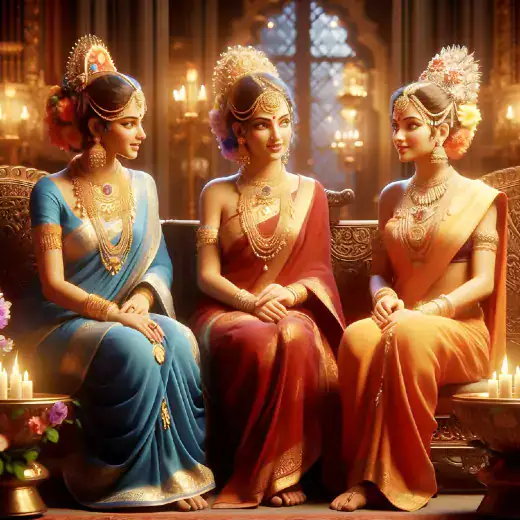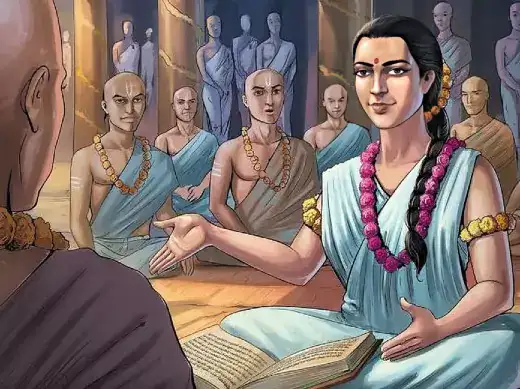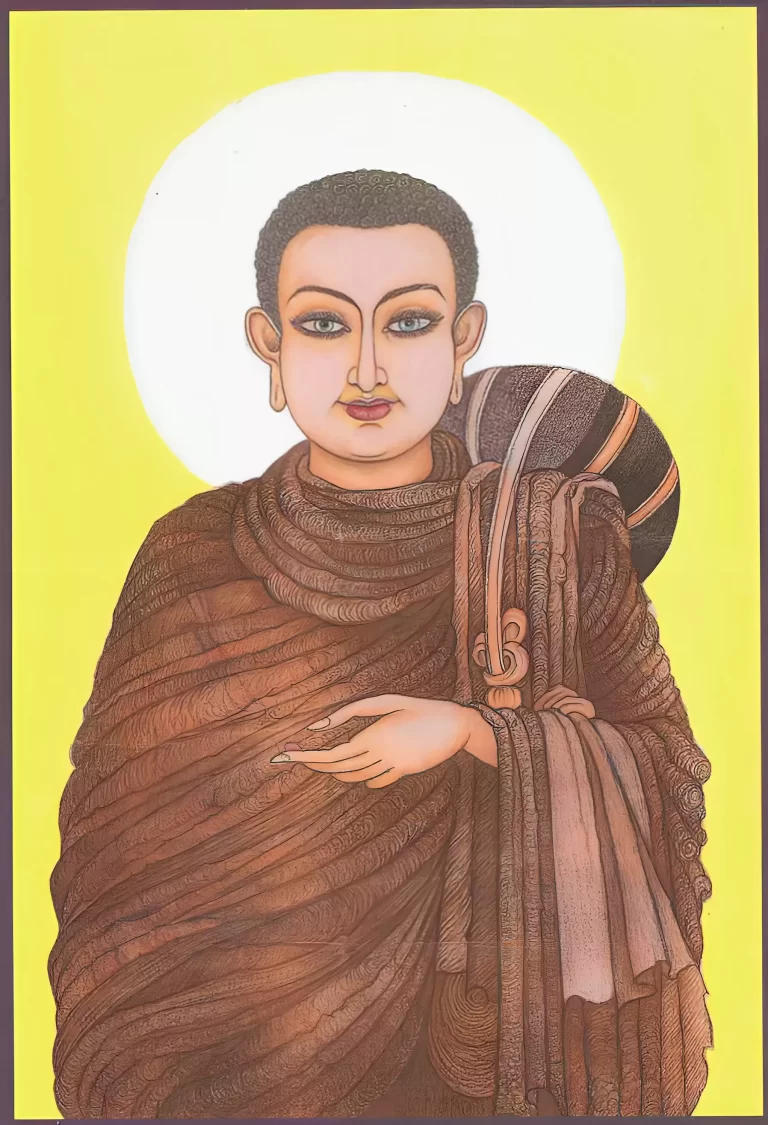Kuṇḍalakesā Therī
Her Past Aspiration
During the time of Buddha Padumuttara, Kuṇḍalakesā was born into the family of a rich man in the city of Haṃsāvtī. She was listening to the Buddha’s discourse, when she saw Subhā Therī being named as the ‘foremost bhikkhu in attaining Arahatship with the quickest Insight’. She wanted most strongly to be named such a foremost bhikkhunī in future time. After making great offering, she made known her aspiration in front of Buddha Padumuttara, who then made the prognostication that her aspiration would be fulfilled during the time of Buddha Gotama.
Her Past Existence as A Daughter of King of Bārāṇasī
After faring for a hundred thousand world-cycles, either in the deva or human realms, Kuṇḍalakesā was reborn as the fourth daughter, named Bhikkhadāyikā, of the seven daughters of King Kikī of Bārāṇasī, during the time of Buddha Kassapa.
In that existence, she, like her other sisters, led a life of chastity for her entire life span of twenty thousand years, observing the ten precepts. She was also a joint donor, together with her sisters, of a great monastic complex for the Sangha.

-
Save
Her Last Existence
Princess Bhikkhadāyikā was reborn either in the deva realm or the human realm for the whole world-cycle during the interim period between the two Buddhas.
During the time of Buddha Gotama, she was reborn as a rich man’s daughter in Rājagaha, by the name of Bhadda. On the same day when she was born, a son was also born to the King’s Counsellor in Rājagaha. At the moment of the birth of the Chief Counsellor’s son, all weapons throughout the city, beginning with those at the King’s palace, dazzled mysteriously.
The King’s Counsellor went to see the King early in the next morning and asked the King: “Great King, did you sleep well?”
To which the King replied: “Master, how could I sleep well? All the weapons in the palace dazzled mysteriously the whole night making us nervous.”
“Great King,” the Counsellor said, “Do not be afraid. Dazzling of weapons took place last night not only in the palace but throughout the city.”
“Why, Master, did that happen?”
“Great King, last night a son was born to my family, whose time of birth coincided with the dominance of certain planets in the zodiac, and whose influence will determine the character of the new-born child. Due to that planetary influence, my son will grow into an incorrigible thief, an enemy to the whole city. But your Majesty, if you so desire, I shall eliminate him.”
“If there is no personal danger to me, there is no reason to eliminate the child.”
The Counsellor named his son, Sattuka (Vile Enemy) as signifying innate quality of the child which was acquired through his stellar influence at birth. As Kuṇḍalakesā grew to age, so also young Sattuka. Even as a young boy of two or three years old, wherever he went, he would snatch anything that he could lay his hands on and took them home. The father admonished him not to do so but he would not listen.
Sattuka The Bane of Rājagaha
When Sattuka attained adolescence, his father, seeing that the son was truly beyond his correction, abandoned him. Giving the youth two pieces of dark cloth (to use in nocturnal exploits), a gadget for breaking open walls and fences and a sweep of twine ladders to his son, he mournfully said to him:
“Take these, you useless boy, make your living by robbery. And be off!”
The young Sattuka proved himself a formidable robber. Making use of the housebreaking gadget and the rope ladder, he would execute housebreaking neatly and rob all the houses of the well-to-do. Not before long every house in the city suffered from his exploits, showing gaping holes in the walls.
When the King made a chariot ride around the city, these holes made a curious sight for the King who then asked the charioteer the reason for them. Being told by the charioteer that all of them were the work of Sattuka, the housebreaker, the King sent for the Mayor and asked him why the robber was not apprehended. The Mayor explained that nobody had ever caught the robber red-handed and hence he was not apprehended. The king ordered him:
“Catch the robber today, or else your life is forfeit.”
His very life being at stake, the Mayor posted undercover men throughout the city and was successful in catching the robber red-handed. Sattuka was apprehended and brought before the King who ordered:
“Take Sattuka out of the city by the South Gate and execute him. The Mayor acknowledged the King’s sentence. He took Sattuka to every cross road in the city where a thousand lashes of whipping were administered to him at each cross road. And thus he was taken towards the South Gate, his hands bound at the back.

-
Save
The Affection of Bhaddā, The Rich Man’s Daughter
At that time, the tumult caused by the people watching the thief being punished aroused the curiosity of Bhaddā (the future Kuṇḍalakesā Therī). She looked out through the window which was carved with a lion motif at the sill. When she saw Sattuka in bondage being savagely whipped (owing to the mutual love and affection that had existed in their past existences), Bhaddā felt great pity for the robber. She felt very unhappy. She went to her bed-room with her hands pressed on her bosom due to her mental pain and lay on her bed with face downwards. As the only child, Bhaddā was the cynosure of the family. The slightest scowl on her forehead caused much concern on the part of the parents.
Her mother went to her and asked the reason for her despair. The daughter did not hide her emotions but opened her heart to the mother that she had such love and affection for Sattuka that she would not live unless she was married to the man. The parents and the relations tried their best to make her see sense but to no avail. Finally they had to yield to her wishes making the conclusion:
“At least that (giving the daughter to the culprit) is better than her death.”
Her father approached the Mayor with a bribe of a thousand gold coins to get the prisoner escape the death penalty, explaining that his daughter was hopelessly enamoured of the robber. The Mayor co-operated. He procrastinated the execution by all sorts of explanations until it was sundown. Then he substituted a prisoner with Sattuka, who was stealthily escorted to the rich man’s house. The substituted prisoner was taken out of the city by the South Gate-and executed (in lieu of Sattuka).
Parental Love
When the rich man secretly received Sattuka from the Mayor’s men, he decided to make his daughter happy by pampering the criminal. He had Sattuka bathed in scented water, dressed up finely, and sent to his daughter’s mansion. Bhaddā was very happy for having obtained her prize. She made herself as lovely as possible with much adornment and attended on Sattuka fondly.
Sattuka’s Wicked Plan
Sattuka’s evilness was such that he coveted Bhaddā’s personal adornments. He thought out a wicked plan and after two or three days, he said to Bhaddā: “I have to say something to you.”
“Say it, my dear,” said Bhaddā, anticipating some good words.
“You might think that you saved my life,” Sattuka said. “As a matter of fact, I owe my life to the guardian spirit of the Corapapāta mountain. I had promised him an offering, if I came out of my captivity alive. Now I am bound by my word to make the spirit an offering. Make necessary preparations.”
Bhaddā, being innocent and loving, readily agreed to comply with the wish of her husband. She prepared offerings, adorned herself fully, and rode in a carriage with Sattuka. At the foot of Corapapāta mountain, she alighted from the carriage and made ready to go up the mountain, accompanied by her attendants. Sattuka, concealing his evil motive, persuaded Bhaddā to go up to the mountain alone because she must have no friend by her side. She carried the offering on her head and went up to the mountain with Sattuka.
Sattuka’s Evil Motive Revealed
Once they were alone together on the ascent to the mountain, Sattuka’s tone suddenly changed in his conversation with Bhaddā. His oily tongue now gave way to harsh usage. Bhaddā was intelligent enough to fathom the evil motive of her robber-husband. When they got to the top of the mountain, Sattuka commanded in his natural harshness:
“Now Bhaddā, take off all your personal ornaments and wrap them up in your upper garment.”
Bhaddā, pretending not to know the evil motive of Sattuka, sweetly replied: “What wrong have I made against you, my Lord?”
“Foolish girl, do you think I came here to make offerings to the mountain spirit? Fie! I dare open the heart of the mountain spirit. I have brought you here alone to rob you of your ornaments.”
Bhaddā’s Wisdom in Facing The Situation
Now that Sattuka’s true colours had been revealed, Bhaddā employed her wit to save herself. Politely she asked:
“But, my Lord, whose ornaments are all these? Whom do I belong to?”
“Look here, I do not understand what you mean. I only know that your property belongs to you and you alone, and has nothing to do with me.”
“Very well, my Lord. My only request is that I be allowed to show my love before I take off my ornaments (and make myself less beautiful to you). Allow me to embrace you from the front, from the sides, and at the rear,” she begged him in a concerning voice.
“Very well,” said Sattuka unsuspectingly.
Bhaddā now quickly embraced Sattuka from the front, and then going to his rear, pretended to embrace him but shoved him off violently over the mountain top. He fell headlong into a deep crevice, his body torn up into parts all along the way down.
(Here is a subtle point in analysing Bhaddās’ mind in her act of self defence. At the moment of her actually pushing the villain off the mountain top, her mind is rooted in hatred and dominated by the mental concomitant of killing. However, the thoughts immediately preceding that killing impulsion and those which immediately follow it are meritorious thoughts called great types of moral consciousness (or Sublime consciousness), Upāya kosalla ñāṇa dominated by skill in strategy to ward off the danger to her life.)

-
Save
The Mountain Spirit lauds The Cleverness of Bhaddā
The mountain spirit who witnessed the astounding wit and courage of Bhaddā, sang two verses in praise of her astute wisdom thus:
(1) A ‘wise person’ may not always be a man in all matters. A woman, with discerning wit in a given situation, may also prove herself to be a wise person.
(2) A ‘wise person’ may not always be a man in all matters. A woman, who can quickly choose her solution to the problem, can very well be a wise person.
After what has happened to her, Bhaddā had no desire to return home. She left the mountain and not knowing where she was going. Her only thought was to become a recluse. She happened to arrive at a place of some (female) ascetics, and asked them to let her join their Order. They asked her:
“Which mode of admission would you prefer? The inferior mode, or the superior mode?”
Being a person endowed with the destiny of winding up her existence, she replied: “Let me be admitted into your Order by the most valued mode of admission.”
The Name ‘Kuṇḍalakesā’
“Very well,” the leading female ascetic said, and they pulled out Bhaddā’s hair one by one with a pair of the shell of the Palmyra fruit. No doubt, shaving the head in this manner is most painful but it was the belief of those ascetics that shaving the head with a blade or a pair of scissors was an inferior mode of admitting one into their Order, and that plucking the hairs one by one was the superior mode. When fresh hair grew again they formed small clusters of rings that resembled ear-rings. Hence Bhaddā came to be called by her new name of Kuṇḍalakesā, ‘one with little ear-ring-like coils of hair’.
Kuṇḍalakesā as A Doctrinaire Ascetics
Kuṇḍalakesā learned all that her ascetic teachers could teach her and, being a person of innate wisdom, decided that there was no superior kind of learning that she could get from them. So she left them and roamed the country in search of further knowledge, learning from various teachers.
In time, she became learned in various doctrines which were acquired at various places and was also unequalled in expounding doctrines. She would go from place to place to find her match in the exposition of doctrines. As a mark of open challenge, she would set up a heap of sand at the entrance to the town or village she visited, on the top of which she would plant a twig of Eugenia. She would tell the children nearby to let everybody know that anyone, who could outwit her in the exposition of doctrines, might signal his or her challenge by destroying the Eugenia twig. If after seven days there appeared no challenger, she would pluck up the Eugenia twig in triumph and go on to another place.

-
Save
Venerable Sāriputta tamed Kuṇḍalakesā
By that time, Buddha Gotama had appeared in the world and was residing at the Jetavana monastery in Sāvatthi. The wandering ascetic Kundalakesā, who wore only a single garment, after touring cities, towns and villages, arrived at Sāvatthi. At the entrance of the city, she set up her symbol of challenge, a heap of sand with a twig of Eugenia planted atop it. After giving word to the children nearby about the meaning of the twig of Eugenia being used, she entered the city.
At that time, the Venerable Sāriputta, the Marshal of the Dhamma, had entered the city for collection of alms-food. He went alone after the other bhikkhus had entered the city for alms-food. This was because he had been discharging the tasks, set by himself, of overseeing the tidiness of the entire Jetavana monastery such as putting bhikkhus’ beddings and articles of use in order, filling water pots, sweeping the grounds, tending to the sick bhikkhus, etc. When he saw the Eugenia twig planted on a heap of sand he inquired the children nearby what that meant. The children explained to him about Kundalakesā’s message. Thereupon the Venerable Sāriputta told them to destroy the Eugenia twig. Some children were reluctant to do so but a few daring ones trampled the Eugenia twig into pieces.
When Kuṇḍalakesā returned from the city after finishing her meal, she saw her Eugenia twig destroyed and asked the boys who was responsible for it. They told her that they did it as asked by Venerable Sāriputta. Kuṇḍalakesā pondered thus:
“Someone who does not know my skills would not dare to challenge me. This Venerable must be someone who has great wisdom and virtue. Now I will announce to all the people that I am going to engage in a test of wits with Venerable Sāriputta, the Marshal of the Dhamma, and thus build up a following of my own before meeting him.”
She spread the news to the people and within a short time the whole city of eighty-thousand houses were informed of the event among themselves.
The Venerable Sāriputta, after having finished his meal, sat underneath a tree, and waited for Kuṇḍalakesā. Then she arrived with a large crowd behind her.
After exchanging cordial greeting with the Venerable Sāriputta, she sat in a suitable place and said:
“Venerable Sir, did you ask the children to destroy Eugenia twig set up by me?”
“Yes, I did,” replied the Venerable.
“Venerable Sir, if that is so, shall we enter into a debate?”
“So be it, young female ascetic.”
“Who should start putting the questions, Sir?”
“It is my privilege to put questions. However, you can begin by asking me about what you know.”
When she had the permission to ask, Kuṇḍalakesā asked the Venerable Sāriputta all the doctrines that she knew. He answered them all.
Then he said: “Young female ascetic, I have answered all your questions. Now I shall ask you a question.”
“Please do Venerable Sir.”
“Ekaṃ nāma Kim?——What is the one factor (that needs to be fully understood)?”
“Venerable Sir, I do not know it.”
“Young female ascetic, you do not know even what a young sāmaṇera knows in our Teaching, what else would you know?”
Thereupon Kuṇḍalakesā, being a person of no mean past merit, knew the worth of her opponent. She said: “May Your Reverence be my refuge!”
“Kuṇḍalakesā,” said Venerable Sāriputta, “You should not take refuge in me. There is the Buddha, the Supreme One among the three worlds, now residing at the Jetavana monastery, in His private chamber. Go and take refuge in the Buddha.”
“Very well, Venerable Sir, I take your advice,” she said.
In that evening she went to the Jetavana monastery where she found the Buddha delivering a discourse. She made obeisance to the Buddha with the five-fold contact and sat in a suitable place.
The Buddha, knowing her ripeness for Enlightenment spoke this verse:
“Better than a thousand verses that deal with trash, not tending to edification, is a single verse (such as one who says: “Unforgetfulness is the way to the Deathless”), by hearing which one is calmed.”
——Dhammapada, V. 101.——
*********************************************
At the end of the verse, Kuṇḍalakesā attained Arahatship and was endowed with the four Discriminative Knowledges. She requested the Buddha to admit her into the Order of Bhikkhunīs. The Buddha agreed. So, she went to a bhikkhunī ‘monastery’ and was admitted as bhikkhunī.

-
Save
Kuṇḍalakesā as The Foremost Bhikkhunī
When the Buddha sat amidst the four kinds of assemblies, there was the lively topic among the audience about the marvellous facility of Kuṇḍalakesā Therī in attaining Arahatship after hearing just a stanza comprising four lines.
The Buddha, with reference to that topic, declared:
“Bhikkhus, among My bhikkhunī-disciples who attain Path-Knowledge quickly, Bhikkhunī Bhaddā, known as Kuṇḍalakesā, is the foremost (etadagga).”
(From the Book: The Great Chronicle of Buddhas | by Ven. Mingun Sayadaw
